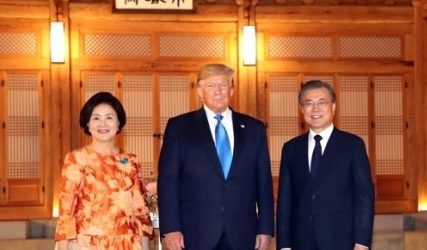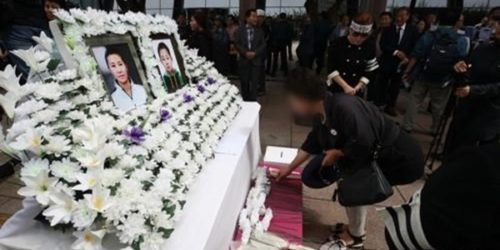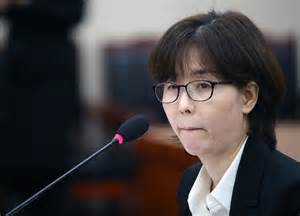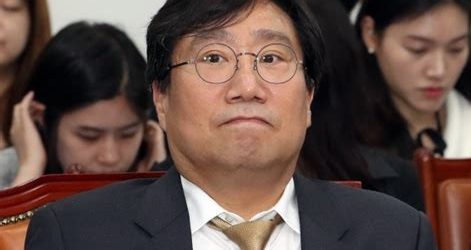“Pressed to Issue 4 Trillion Won in Bonds” Shin Jae-min’s Additional Disclosure!
2018-12-31, Chosun Monthly (Wolgan Chosun)
Did (the Moon Jae-in administration) issue bonds as a means to increase the size of the debt during the Park Guen-hye Administration?
“Is the group in the Blue House really making policies that are for the people when they say that (the policies) should be kept unconditionally since the matters were reported to the president? And discard considering the rationality of the policy?… As one of the people who went to the candlelight demonstrations, I can’t understand it at all. Didn’t they change the government, saying this kind of behavior is problematic and shouted “Is this [the kind of] country [that we want to live in]?” Why didn’t the new government change the policy decision-making process? Didn’t they say it’s the government for the people?”
–Shin Jae-min, former civil servant [Mid-level working level civil servant, Level 5] at the Ministry of Economy & Finance
Civil servant Shin Jae-min, who revealed that “The Blue House ordered the replacement of the president of KT & G [Korea Tobacco & Ginseng company]” in a YouTube video, asserted that the Blue House in 2017 ignored the opposition of the Ministry of Economy & Finance [MOEF], and pressured [MOEF] to issue 4 trillion won [~$3.6 billion] in additional sovereign bonds.
The timing of the Moon Jae-in government that launched in 2017 is interlocked with the Park Geun-hye government. The claim is that by issuing unnecessary bonds, the Moon administration used a trick to increase the debt of the former government.
“Pressure to Issue Additional Bonds”
The former civil servant Shin Jae-min wrote that “there was also a pressure to issue 4 trillion won worth of bonds” in an article titled “The second reason that I left the Ministry of Economy and Finance” in the GoPass, a student bulletin board of his alma mater Korea University.
Deficit government bonds are issued to raise money that is in short supply when annual government expenditure is higher than the tax revenue. This procedure increases the national debt. At the time the issuance of government bonds was discussed, the amount of revenues was greater than expenditures, so it was not necessary to issue deficit-financed bonds.
According to Shin, on November 14, 2017, Kim Dong-yeon, [dual hatted as] the Deputy Prime Minister for Economy as well as the Minister of Economy & Finance at that time, ordered the cancellation of the 1 trillion won (~$900 million) early repayment bid on the next day (15th). [Instead of repaying unneeded debt, Kim chose to hold on to the money. Paying off the bonds early would have reduced the debt that the government held and saved money by dispensing with the need to make the interest payments on the bonds.]
Shin said, “The maximum issuance amount of deficit-type government bonds approved by the National Assembly in 2017 was 28.7 trillion won (~$25.8 billion).” He explained “At the first half of the year in late June, my calculation of expected revenue for 2017 exceeded 20 trillion won (~$18 billion). We already issued a total of 20 trillion won (~$18 billion) worth of government bonds, so we thought that the remaining 8.7 trillion won [of bonds authorized by the National Assembly] was not to be issued.”
If the government issues 8.7 trillion won (~$7.8 billion) worth of deficit bonds, it will cost about 200 billion won (~$180 million) a year in interest. More importantly, it was not necessary to issue government bonds, because tax revenue was stabilized. Shin explained that, at the time, the head of the MOEF’s Treasury Department reported the situation up to the leadership chain.
The Meaning of “Political Judgement” (Jeongmoo-jeok Pandan, 정무적 판단) said by Kim Dong-yeon, former Prime Minister of Economy [and Minister of MOEF]
However, Shin said he had been instructed to write a report on November 13, 2017 to issue additional government bonds. Apparently, it was a decision based on the “political judgement” of Prime Minister (PM) Kim. Shin explained the “political judgement” this way:
“The benchmark time that will be subject to comparison will be 2017, which is the year the Park Geun-hye administration was replaced. If we consider the future, it means we should not lower the debt-to-GDP ratio in 2017. If we lower the debt-to-GDP ratio at this time, it could come back as a [political] burden on the [Moon] administration [because Moon government’s steep increases in spending, which would need debt financing].”
Shin said, “I did not understand why the Deputy Prime Minister was telling this story.” Shin asserted that in the end, MOEF canceled the planned repurchase of government bonds to establish an excuse to increase the deficit government bonds.
In fact, the MOEF announced through the Bank of Korea website that it canceled the repurchase of treasury bonds scheduled for the next day at the close of the market on December 14th last year. The MOEF was to repurchase a total of 8 treasury bond types, including the ones expiring at the end of March 2018, by the competitive bidding system the next day. It was unusual for the government to abruptly withdraw its repurchase of government bonds the day before.
4 Trillion won Bond Issuance → Opposition of Director in Charge → Pretend It was Nothing
The cancellation threw the bond market into chaos, Shin recalled. “Investors who invested a lot of money in falling interest rates in futures markets would have suffered large losses,” he wrote.
Shin said that in the end, a report was created, stating additional 4 trillion won [$3.6 billion] of deficit bonds could be issued in consideration of the impact of the bond market, and it was reported to the former Deputy PM Kim. Shin said, “Former Deputy PM Kim repeatedly asked, ‘Is this the limit?’ and said it’s a pity [it’s not enough], and [it’s politically] burdensome [to the Moon administration because the gap between the Park administration and the Moon administration in the debt-to-GNP ratio will still be greater than desired by the Moon administration], but let’s issue it at this level.”
However, the director in charge [at MOEF] balked and redrafted a report stating that deficit treasury bonds should not be issued, and the former Deputy PM Kim had finally turned to the position of canceling the issuance of additional deficit bonds.
Blue House: Issue as Planned [per the pressured report]
This time, the Blue House then started to make trouble, including calling the head of the office [in charge of the report] to demand the reason for canceling the issuance of the bonds. The Blue House pushed for the issuance of additional government bonds as planned [per the report that was prepared by MOEF under pressure to issue more bonds].
Shin said it [the demand to issue bonds] was for the same reason as for the former Deputy PM Kim demanding the cancellation of early repayment of government bonds. During the process, former Deputy PM Kim asked for monthly reports to go up to the president. Shin said, “The Blue House said the matter was already decided and reported to the president, so it cannot be turned around. [The Blue House] demanded the bonds be issued as planned.”
Even after the MOEF distributed a press release to the effect that there is no additional issuance of deficit-type government bonds, the Blue House demanded the issuance of additional government bonds. Shin asserted that the [Blue House] had demanded the issuance of bonds through the re-announcement of the issuance of government bonds.
Shin said, “As a person who attended the candlelight demonstrations [expecting clean, just, competent government], I just cannot understand the situation at all.”
The original article in Korean in the Chosun Monthly (Wolgan Chosun) http://m.monthly.chosun.com/client/mdaily/daily_view.asp?Idx=5792&Newsnumb=2018125792
For Shin Jae-min’s video, see https://youtu.be/wMaATnDIkW4





